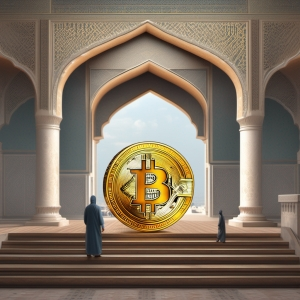Table of Contents:
Introduction to Bitcoin Trading
Bitcoin trading has been a hot topic in the financial world due to its increase in popularity over the past few years. When trading Bitcoin, one doesn't buy or sell the actual physical Bitcoin, but instead trades the price movements of this digital asset. It involves buying Bitcoins at a low price and selling them when the price rises, hence making a profit.
This unique form of digital asset trading provides immense opportunities for profit and growth. However, it's crucial to understand the intricacies and potential risks of such trading strategies. Navigating through the concept of Bitcoin trading can be challenging for beginners. Therefore, it is essential to grasp the basic understanding around Bitcoin and its trading provisions before diving deep into this subject.
Interestingly, the topic of Bitcoin trading seems to cross paths with the realm of faith and ethics in various communities. One such discussion gaining momentum is whether Bitcoin trading aligns with Islamic financial principles, leading us to question: "Is Bitcoin trading haram?"
This article aims to shed light on this intriguing intersection of finance and faith. We will be exploring the concept of Bitcoin trading further and discussing whether it falls under the category of being haram (forbidden) or halal (permitted) as per Islamic principles.
Examining the Concept of Haram in Islamic Finance
To get a clear picture of the question "Is Bitcoin trading haram?", it is necessary to explore the meaning of 'Haram' within the framework of Islamic Finance. 'Haram' is an Arabic word which translates to 'forbidden' or 'prohibited' in English. In the realm of Islamic finance, any financial activity that violates the principles of Quran and Hadith is considered as haram.
Key principles that determine whether an activity or transaction is halal (permitted) or haram include:
1. The prohibition of Riba (Interest): In Islamic finance, transactions involving 'Riba' or 'usury' are strictly forbidden as they are deemed exploitative.
2. Ethical investing: The investments should be in line with Islamic ethics, meaning that they should not involve any activities that are against Islamic principles such as gambling, alcohol, and pork-related products.
3. The concept of 'Gharar': This refers to 'uncertainty' or 'ambiguity' in a transaction. It is forbidden in Islamic finance and must be avoided.
These defining factors play a pivotal role in assessing the legitimacy of Bitcoin trading from an Islamic perspective.
Understanding Bitcoin and its Functionality
Bitcoin is a form of digital currency, created and managed electronically. Invented by an anonymous programmer known as Satoshi Nakamoto in 2009, it pioneered the concept of cryptocurrencies. Unlike traditional currencies such as the dollar or euro, Bitcoin is decentralized, which means no central authority such as a bank or government controls it.
Bitcoins are created through a process known as 'mining'. This process involves solving complex mathematical problems using computer hardware. Once solved, a new block is added to the blockchain, and in return, the miner is awarded a certain amount of Bitcoins.
Another important aspect of Bitcoin is its finite supply. There is a limit of 21 million Bitcoins that can be mined, ensuring that it cannot be manipulated or diluted by any entity. This scarcity is one of the key reasons for Bitcoin's value.
The most significant use of Bitcoin is as a medium of exchange or a store of value, much like traditional money. However, what sets Bitcoin apart is its digital-only state, making it both global and easily accessible. Additionally, the peer-to-peer nature of Bitcoin transactions ensures privacy and freedom from interference from financial institutions.
Now that we understand the principles and operations behind Bitcoin, let's delve further into the discussion of whether Bitcoin trading is haram or not.
Is Bitcoin Trading Haram - A Deep Dive

With a grasp on the principles guiding Islamic finance and a clear understanding of Bitcoin, our discourse can now focus on the central question: Is Bitcoin trading haram?
The exact nature of Bitcoin trading may vary according to various factors such as the trading platform, the intention of the trader, the structure of the trade transaction, and more. Therefore, it cannot be universally declared as halal or haram.
That being said, regarding the prohibition of interest or riba, it's worth noting that Bitcoin, by its nature, does not yield interest. One cannot lend a Bitcoin and receive more Bitcoins in return after a set period, like with a traditional savings account or investment. As such, Bitcoin trading does not infringe upon this aspect of Islamic finance.
When it comes to the principle of Gharar, or uncertainty, things get a bit more complex. The volatile nature of Bitcoin's price might be seen as inducing uncertainty into the transaction. However, this argument quickly dissolves when one considers the inherent risk in any form of trading - be it stocks, commodities, or forex. The uncertainty is a part of the nature of trading, and as such, it does not make Bitcoin trading inherently haram.
Lastly, examining the principle of ethical investing, Bitcoin does not fund or support industries considered haram, as it is a standalone digital asset, unlike shareholding in a company that might go against Islamic ethics. Still, the purpose for obtaining and using Bitcoins could potentially introduce ethical concerns. If it is used in the support of illicit activities, it then goes against the rules of ethical investment.
Despite the potential areas of contention outlined above, a multitude of Islamic scholars have taken the position that Bitcoin trading isn't essentially haram. They see it more as a matter of how it's used and the intention behind its use that can denote it as halal or haram. Consequently, a blanket ruling on this matter cannot, and should not, be made.
Taking the Opinions of Islamic Scholars into Account
A broad spectrum of views exist among Islamic scholars about the permissibility of Bitcoin trading. The contrasting opinions primarily stem from differing interpretations of Islamic law regarding modern digital currencies. While some scholars deem Bitcoin trading as halal, others consider it haram.
Those who regard Bitcoin trading as halal often argue that Bitcoin bears resemblance to commodities like gold and silver. They view it as a valid form of currency that abides by the laws of supply and demand. Furthermore, it doesn't involve interest rates (riba), and its transactional process is transparent, reducing the elements of deceit and betrayal.
Conversely, scholars seeing Bitcoin trading as haram point to its extreme price volatility and the uncertainty associated with it. The lack of a centralized authority for control and regulation is also seen as a risk and leads to an argument for the absence of ownership certainty, which can make it seem like gambling—a practice that is considered haram.
It's essential to add here that these interpretations are not universally accepted and vary depending on individual scholars' perspectives. Thus, if you are a devout Muslim considering Bitcoin trading, it is highly advised to consult with a knowledgeable and trusted Islamic scholar or financial advisor.
Dividing Line: Halal vs Haram Bitcoin Trading

The line between halal (permitted) and haram (forbidden) when it comes to Bitcoin trading isn't a black and white matter. Given Bitcoin's decentralized nature and its lack of traditional interest returns, some scholars argue it abides by Islamic financial principles, making it halal.
However, the high volatility of Bitcoin's price raises concerns about Gharar (uncertainty). The dramatic price changes can be risky, and the unpredictability may turn some trading activities into something resembling gambling, which is unmistakably haram in Islam. If a trader is relying more on luck than a calculated strategy, then the trading activity might be considered haram.
Besides, some platforms offer leverage Bitcoin trading, which theoretically might imply the involvement of interest, or Riba, making it haram. However, if the trading process involves thorough research and a clear strategy, respecting the principles of ethical finance, it could be viewed as halal.
Another critical factor in determining the halal or haram nature of Bitcoin trading is the trader's intent. Buying and holding Bitcoin for personal use or to protect against inflation could be seen as halal. Trading Bitcoin with the sole intent of making a quick profit, especially without any regard for potential losses, might fall into the haram category since it resembles gambling.
It is, therefore, crucial for Muslims who are considering trading or investing in Bitcoin to consult with a knowledgeable and trustworthy Islamic scholar or a financial advisor well versed in both Islamic finance and cryptocurrencies.
Conclusion and Final Thoughts
To sum up the discussion, whether Bitcoin trading is haram or not depends on the specifics of each individual trading activity, including the intention behind the transaction and the nature of the trading methods used. Under certain circumstances, Bitcoin trading aligns with the principles of Islamic finance, but in other situations, it may not.
Given the novelty of cryptocurrencies and their rapid evolution, scholars and experts in Islamic finance are gradually exploring this topic in-depth. It's imperative to monitor ongoing research and religious discussions to maintain a balanced and informed Islamic perspective on Bitcoin trading.
Islam advocates financial freedom, balanced with moral and social values. It's important to embrace new financial technologies such as Bitcoin, while ensuring we are mindful of Islamic principles. As each individual's circumstances are unique, anyone uncertain about their Bitcoin activities within the context of their faith should seek advice from knowledgeable resources, scholars or Islamic finance experts.
In conclusion, the topic of Bitcoin trading in relation to Islamic finance is vast and multifaceted. While no definitive stance can be taken without comprehensive knowledge of a specific transaction's details, the intent of the trader, and the ongoing developments in this complex space, it does appear that Bitcoin can fit within the ethical and financial guidelines set forth in Islamic principles and finance. This underlines the importance of continued exploration and understanding in this cutting-edge intersection of finance and faith.
Frequently Asked Questions about "Is Bitcoin Trading Haram?"

What is Bitcoin trading?
Bitcoin trading involves buying and selling Bitcoins, usually on Bitcoin exchange platforms, with the aim of making a profit.
Why could Bitcoin trading be considered Haram?
In Islam, any form of gambling or speculative trading is considered Haram, or forbidden. As such, Bitcoin trading may be seen as Haram if it is approached as a form of gambling.
How can Bitcoin trading be Halal?
Bitcoin trading can be Halal if it is done in a manner that complies with Islamic principles of finance, such as the prohibition of Riba (interest), Gharar (uncertainty), and Maysir (gambling).
Are all cryptocurrencies considered the same in Islam?
Not necessarily. The Islamic rulings on cryptocurrencies may vary based on their specific features and uses. Therefore, it is recommended to consult with a knowledgeable Islamic scholar when dealing with a specific cryptocurrency.
What are the risks of Bitcoin trading?
Bitcoin trading carries several risks, including potential financial loss due to market fluctuations, cybersecurity threats, and regulatory changes. Therefore, it is essential to fully understand these risks before engaging in Bitcoin trading.












